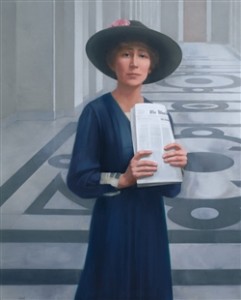
Sharon Sprung’s portrait of Jeannette Rankin in the Collection of the U.S. House of Representatives.
As of November, for the first time in history, the United States Congress will have 100 women. With the swearing in of Alma Adams of North Carolina, the 113th Congress will consist of a record number of women, and will also be welcoming its first Republican African-American woman, Mia Love of Utah. Although these are major steps for women in government, women still constitute less than one-fifth of Congress, and out of 20 House Committees, only one is chaired by a woman. Nevertheless, the face of Congress has changed substantially since the years of Jeannette Rankin, the first woman to serve in Congress.
In a case of historic irony, Jeannette Rankin was elected in 1916, four years before the 19th Amendment guaranteeing women’s suffrage was passed. She was born in Montana in 1880 and received a degree from Montana State University before attending the New York School of Philanthropy. She entered the political world as a lobbyist for the National American Woman Suffrage Association and helped to secure the right to vote for women in Montana in 1914.
Already well known as a suffragette, Rankin ran for a seat as a House Representative for Montana. Although Montana was a largely Democratic state, she ran as a progressive Republican stressing social issues and taking a decidedly anti-war stance on the verge of the American involvement in World War I. On August 29, 1916, the United States elected Jeannette Rankin as its first female Representative. Her first term was ushered in with a House debate of historical significance, and only a few days after she was sworn in Congress voted on a war resolution. In an attempt to stay in line with her voter’s wishes she was one of only 50 votes against going to war with Germany and its allies, a move that brought her criticism in the press.
In her first term, Rankin helped to create and headed a Committee on Women’s Suffrage and worked extensively with mining unions to negotiate working conditions. Later, Rankin was faced with redistricting that would almost guarantee her loss–but when bribes were offered to prevent her from running, she ran anyway, simply to prove that she would not accept money to leave politics. From 1919 to 1940 Rankin remained very active politically, become a very prominent anti-war lobbyist and pushing social welfare legislation. Amazingly enough, she ran again in 1940 due to the possibility of a return to war, and predicted that, “No one will pay any attention to me this time. There is nothing unusual about a woman being elected,” demonstrating the rapidly changing status of women in politics. She was then the sole vote against joining World War II after the bombing of Pearl Harbor and later in life went on to lead anti-Vietnam protests and marches.
Many strides remain to be made in the field of women in politics, but thanks to Jeannette Rankin we can now affirm what she predicted to be true–no longer is there anything unusual about women taking on leadership roles in the United States of America.
For an interesting analysis of the members of the 114th Congress, listen to NPR’s Morning Edition (transcript available as well).
-Katie Watkins
Junior Girl
Girl Museum Inc.
